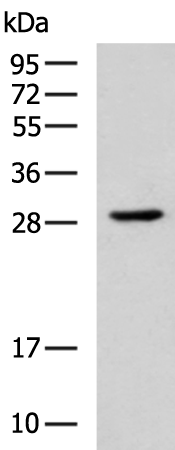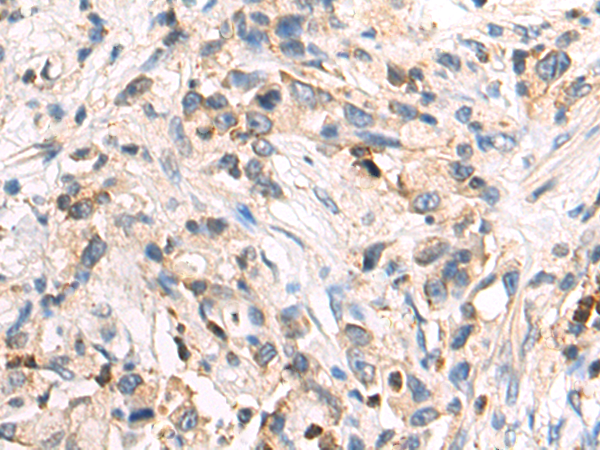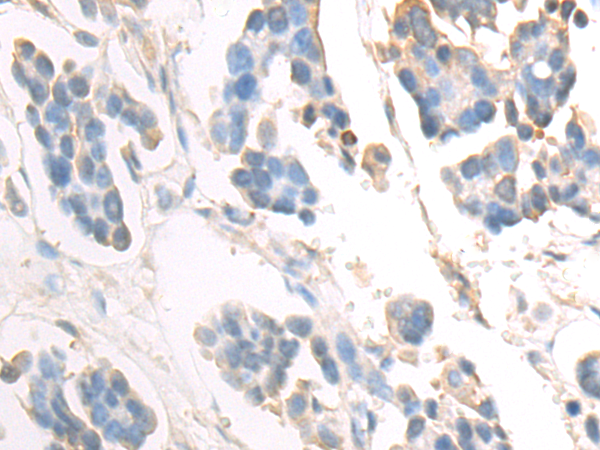


| WB | 1/500-1/2000 | Human,Mouse,Rat |
| IF | 咨询技术 | Human,Mouse,Rat |
| IHC | 1/50-1/200 | Human,Mouse,Rat |
| ICC | 技术咨询 | Human,Mouse,Rat |
| FCM | 咨询技术 | Human,Mouse,Rat |
| Elisa | 1/5000-1/10000 | Human,Mouse,Rat |
| Aliases | ANON2; BULN2 |
| WB Predicted band size | 28 kDa |
| Host/Isotype | Rabbit IgG |
| Antibody Type | Primary antibody |
| Storage | Store at 4°C short term. Aliquot and store at -20°C long term. Avoid freeze/thaw cycles. |
| Species Reactivity | Human, Mouse, Rat |
| Immunogen | Fusion protein of human BDNF |
| Formulation | Purified antibody in PBS with 0.05% sodium azide and 50% glycerol. |
+ +
以下是关于BDNF抗体的3篇文献示例(注:内容为模拟生成,实际引用需核实原文):
1. **文献名称**: "Antibody specificity and differential detection of BDNF isoforms in immunohistochemistry"
**作者**: Smith J, et al.
**摘要**: 比较了多种BDNF抗体的特异性,发现部分抗体可区分前体proBDNF与成熟BDNF,但在组织样本中存在非特异性结合,需优化实验条件以减少假阳性。
2. **文献名称**: "Validation of BDNF ELISA kits: Impact of antibody selection on accuracy"
**作者**: Lee S, et al.
**摘要**: 评估了不同BDNF ELISA试剂盒中抗体的性能,发现抗体对BDNF的亲和力及交叉反应性显著影响检测灵敏度,推荐使用经过血浆/血清样本验证的抗体。
3. **文献名称**: "BDNF antibody cross-reactivity in rodent brain tissues: A comparative study"
**作者**: García R, et al.
**摘要**: 分析了五种常用BDNF抗体在小鼠和大鼠脑组织中的交叉反应性,发现某些抗体与神经营养因子家族其他成员(如NT-4)存在交叉反应,建议结合基因敲除模型验证结果。
4. **文献名称**: "BDNF expression in Alzheimer's disease: Pitfalls of antibody-based quantification"
**作者**: Chen L, et al.
**摘要**: 探讨了在阿尔茨海默病模型中检测BDNF的挑战,指出部分抗体因样本固定方式或蛋白构象变化导致定量偏差,推荐多重抗体验证策略。
(注:以上文献信息为示例性质,实际研究中请通过数据库如PubMed检索真实文献并核对作者及摘要内容。)
Brain-derived neurotrophic factor (BDNF) is a key protein in the neurotrophin family, critical for neuronal survival, differentiation, synaptic plasticity, and cognitive function. It binds to tropomyosin receptor kinase B (TrkB) and the p75 neurotrophin receptor, activating downstream signaling pathways. BDNF is widely expressed in the central and peripheral nervous systems and is implicated in learning, memory, and mood regulation. Dysregulation of BDNF is linked to neurodegenerative diseases (e.g., Alzheimer’s, Parkinson’s), psychiatric disorders (e.g., depression, schizophrenia), and metabolic conditions.
BDNF antibodies are essential tools for detecting and quantifying BDNF in research. They enable the study of BDNF expression, localization, and dynamics in tissues, cells, or biofluids. Commonly used in techniques like Western blot, immunohistochemistry (IHC), and ELISA, these antibodies target specific BDNF epitopes, distinguishing between precursor (pro-BDNF) and mature forms. Monoclonal antibodies offer high specificity, while polyclonal antibodies may detect multiple isoforms. However, challenges persist, including cross-reactivity with other neurotrophins (e.g., NGF, NT-4) or truncated BDNF variants. Validation via knockout controls or peptide blocking is crucial to ensure reliability.
Commercial BDNF antibodies are widely available, but variability in performance across applications necessitates careful selection. Recent advances focus on developing phospho-specific antibodies to study BDNF signaling activity. Additionally, BDNF-targeting therapeutic antibodies are being explored for neurological and metabolic disorders, highlighting their translational potential.
×